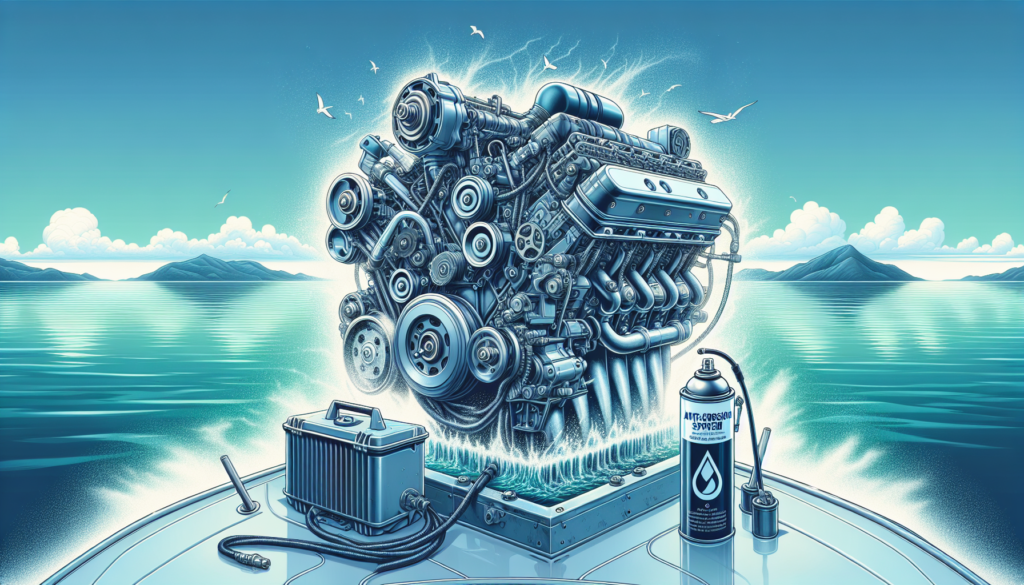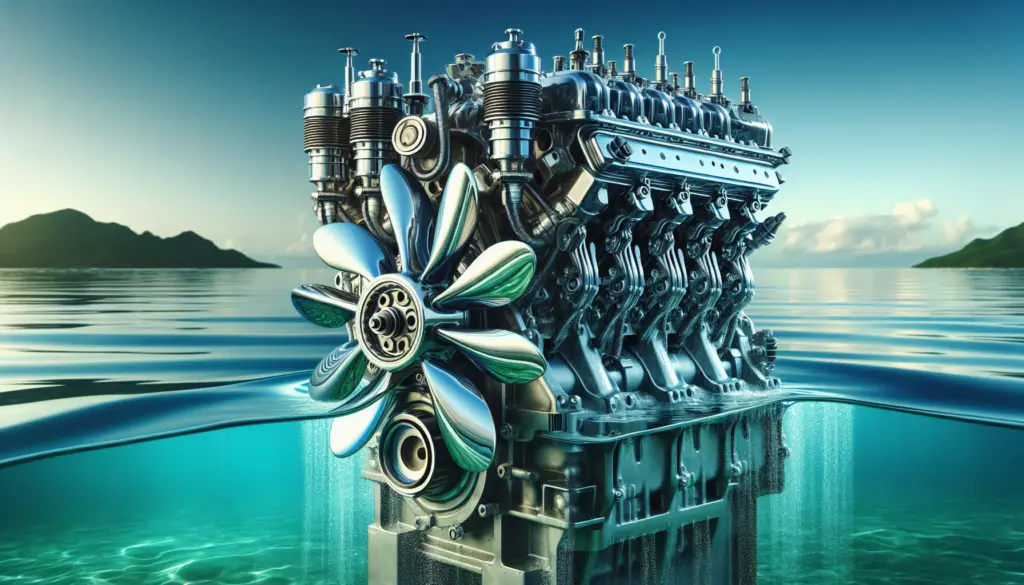If you’re a fan of saltwater boating, then you know how crucial proper engine maintenance is for a seamless experience at sea. “Top Boat Engine Maintenance Tips for Saltwater Use” is the go-to guide filled with expert advice to help prolong the lifespan of your boat’s engine. Learn how to ensure high performance and efficiency while receiving essential tips for optimizing your precious investment against the corrosive effects of saltwater, minimizing potential damages and costly repairs. Whether you’re an experienced mariner or a novice at sea, this comprehensive article is tailored to equip you with practical and reliable maintenance routines.
Understanding the Impact of Saltwater on Boat Engines
When it comes to maintaining your boat engine, one element that presents a significant challenge is saltwater. Understanding what it does to your engine can help you take the necessary measures to keep it running smoothly.
Chemical Properties of Saltwater
Saltwater is a natural electrolyte due to its salt content, which means it’s great at conducting electricity. This increases the speed of metal corrosion, especially iron and steel. Besides corrosion, saltwater also has a high concentration of dissolved minerals, leading it to deposit salt over time, which can clog up your boat engine parts.
How Saltwater Affects Different Materials in the Boat Engine
Different materials in the boat engine react uniquely with saltwater. Essential parts of the engine like cooling systems, exhaust manifolds, and other metal components get corroded over time due to continuous exposure to salt. Rubber parts such as hoses, seals, and gaskets can also degrade faster, while electrical connections may suffer due to the excellent conductivity of saltwater.
Long-term Impact of Saltwater Exposure
The long-term effects of saltwater on your engine can be quite severe if not properly managed. These include decreased engine performance, shorter lifespan of components, and increased costs due to more frequent repairs or replacements.
Pre-Surface Maintenance for Marine Engines
Maintaining the external surface of your boat engine is as crucial as taking care of its inner components if you want it to last longer.
Cleaning the Engine Surface
A clean engine surface can help identify any irregularities or damages that might not be visible in the presence of grime and salt. Use fresh warm soapy water and a soft sponge to gently wash down the engine surface. Avoid using abrasive materials that can damage the engine paint or exposed metals.
Removing Salt Deposits
Over time, salt deposits from the evaporated saltwater can gather on the engine, leading to corrosion and potential clogging. Use a solution of warm fresh water and vinegar, which is excellent for breaking down these salt deposits.
Preventing Corrosion
Preventing corrosion starts with a good clean, followed by the application of anti-corrosion sprays or coatings available specifically for marine engines. These provide a protective layer to resist the corrosive effects of saltwater.

Periodic Engine Inspections and Tune-Ups
Regular inspections and tune-ups can help correct minor issues before they turn into costly problems.
Monitoring Engine Performance
Monitor your boat engine’s performance regularly, by paying attention to unusual noises, abnormalities in speed or power, or anything out of the ordinary.
Routine Engine Tune-Ups
A routine tune-up, which involves checking and adjusting all the essential parts of engine function, goes a long way in ensuring your engine runs smoothly. This should include checking the oil and fuel filters, spark plugs, and belts.
Decoding Warning Signs of Engine Malfunction
Conventionally, your boat engine will show signs before a major malfunction. Signs like overheating, oil leaks or irregular noises, if correctly decoded, can save you from substantial damage.
Lubrication for Saltwater-Exposed Boat Engines
A well-lubricated boat engine has less friction amongst its parts, enabling it to perform better and last longer.
The Role of Lubrication in Reducing Damage
Proper lubrication can not only reduce wear and tear by lowering the friction between moving parts but can also help in preventing corrosion by providing a protective layer against saltwater.
Choosing the Right Engine Oil
Engine oil selection is an integral part of engine maintenance. Synthetic marine oils, specifically made for boat engines, are a popular choice as they withstand saltwater conditions better and provide superior protection.
Frequency of Oil Changes for Marine Engines
Regular oil changes are crucial for engine health. A good rule of thumb is to change the oil every 100 hours of operation or at least once a year, whichever comes first.

Properly Rinsing the Boat after Every Use
Rinsing your boat after every use can save you from a lot of problems linked with saltwater.
Why Rinsing is Imperative after Each Sail
Saltwater left on your boat can dry and deposit salt, hastening corrosion, and potential damage. A quick rinse can dissolve and remove this salt, protecting your boat and its engine.
Effective Rinsing Techniques
Begin by thoroughly rinsing the boat with fresh water, focusing on the engine and other metallic parts. Pay special attention to the hard-to-reach spots as they can become hidden breeding grounds for corrosion.
Products to Assist in Thorough Rinsing
There are multiple products in the market that assist in efficient rinsing. Salt removal sprays, for example, are great to use on your engine and other parts after the fresh water rinse.
Fuel System Maintenance for Saltwater-Operating Boats
The fuel system, although not directly exposed to saltwater, also needs proper maintenance to ensure ideal performance.
Impact of Saltwater on the Boat’s Fuel System
Saltwater may intrude into the fuel system, causing the fuel to be contaminated. This can affect the engine performance, or in worst cases, even cause engine failure.
Safety Measures for Fuel System Maintenance
Always make sure to turn off the engine before you start servicing the fuel system. Also, work in well-ventilated areas to avoid inhaling harmful fumes.
Tips for Keeping the Fuel System Clean and Efficient
Ensure you use only clean, fresh fuel and keep your fuel tank as full as possible to prevent condensation. Regularly check and change the fuel filters, and use additives that can prevent fuel system issues.
Maintaining the Boat’s Cooling System
The cooling system plays a crucial role in preventing the boat engine from overheating.
Why Keeping the Cooling System Clean is Crucial in Saltwater Conditions
In saltwater conditions, the cooling system can get clogged due to salt deposits. Moreover, saltwater can cause corrosion inside the cooling passages, affecting engine performance.
Steps for Cleaning and Maintaining the Cooling System
Regularly flush your cooling system with fresh water to remove any salt or scale build-up. Also, make sure to replace the coolant according to the manufacturer’s recommendations.
Troubleshooting Common Issues with the Cooling System
Become familiar with signs indicating cooling system issues. These could include an overheating engine, coolant leaks, or fluctuations in the gauge readings.
Ideal Storage Practices for Saltwater Boats
Storing your boat correctly can significantly extend its lifespan.
The Effect of Proper Storage on Engine Longevity
When properly stored, your boat engine is safe from adverse effects of the weather, UV rays, and excess salt, ensuring the engine runs well for a longer time.
Choosing the Right Location and Conditions for Storage
Choose a dry, cool location with sufficient ventilation to store your boat. Using covers designed for boats can also protect from dust and damage.
Preparing Your Boat Engine for Storage
Before storing your boat engine, make sure to clean it properly, change the oil, and fill the fuel system to prevent condensation. Also, disconnect the battery to prevent any power drain.
Annual Boat Engine Services for Saltwater Use
Professional servicing can spot any potential big-ticket problems early, ensuring your boat engine continues to function at its best.
Importance of Professional Inspections and Cleaning
Professional inspections can detect any hidden wear and tear or damages that might not be visible to the untrained eye. They can also thoroughly clean areas that are difficult to reach during routine cleaning.
What to Expect During an Annual Service
The mechanic will perform a thorough visual examination of your boat engine and its components, followed by deep cleaning, lubrication, and necessary repairs or replacements.
Scheduled Replacements and Upgrades to Consider
Regularly update any outdated components of your engine. Scheduled replacements include changing the belts, impellers, oil filters, and spark plugs to ensure they don’t fail when you’re out on the water.
Dealing with Saltwater-Related Damages in Boat Engines
Despite our best efforts, some damages are inevitable in saltwater conditions. It’s crucial to know how to handle such situations.
Common Saltwater Related Damages
Saltwater related damages usually include corrosion and rusting, salt build-up leading to blocked passages and accelerated wear and tear of some engine parts.
Addressing Rust and Corrosion
If you notice rust or corrosion, it’s crucial to address it immediately. Use a wire brush to remove surface rust, followed by an application of appropriate paint or sealant to protect it.
Repairs and Parts Replacements for Saltwater-Damaged Engines
When facing extensive damage, professional repair or parts replacement becomes necessary. Work with authorized service providers to ensure your engine gets the best care.
Remember, your boat engine’s life and performance depend significantly on how you maintain it, particularly in saltwater conditions. Your diligence in care and maintenance will ensure that you enjoy plenty of good times on the water.

